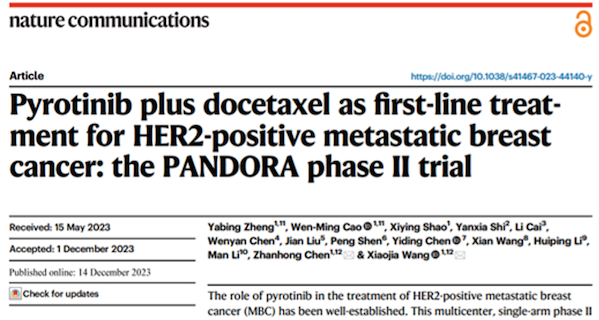Hengrui’s Innovative Drug Pyrotinib Combined Therapy for HER2-Positive Metastatic Breast Cancer Featured in the Sub-journal of ‘Nature’
December 28, 2023
Source: drugdu
 304
304
 Recently, the "Pyrotinib Combined with Docetaxel as First-Line Treatment for HER2-Positive Metastatic Breast Cancer: An Open, Multicenter Phase II Clinical Study (PANDORA)" led by Professor Wang Xiaojia from the Affiliated Cancer Hospital of the University of Chinese Academy of Sciences (Zhejiang Cancer Hospital) was officially published in the internationally renowned journal "Nature Communications," a sub-journal of 'Nature' (Impact Factor: 16.6). The research results indicate that the combination therapy of pyrotinib and docetaxel demonstrates excellent anti-tumor activity and brings about progression-free survival (PFS) benefits.
Recently, the "Pyrotinib Combined with Docetaxel as First-Line Treatment for HER2-Positive Metastatic Breast Cancer: An Open, Multicenter Phase II Clinical Study (PANDORA)" led by Professor Wang Xiaojia from the Affiliated Cancer Hospital of the University of Chinese Academy of Sciences (Zhejiang Cancer Hospital) was officially published in the internationally renowned journal "Nature Communications," a sub-journal of 'Nature' (Impact Factor: 16.6). The research results indicate that the combination therapy of pyrotinib and docetaxel demonstrates excellent anti-tumor activity and brings about progression-free survival (PFS) benefits.
Research Background:
Dual-targeted therapy with trastuzumab combined with taxanes has established the first-line standard treatment for HER2-positive advanced breast cancer [Progression-Free Survival (PFS): 18.7m vs. 12.4m, P<0.001; 8-year Overall Survival (OS) rate: 37% vs. 23%, P<0.001]. However, the inclusion of trastuzumab in the Cleopatra study in a population with prior trastuzumab (referred to as "H") treatment was only 11%, and it may no longer fully guide current clinical practice. Large-scale clinical studies exploring the efficacy of continuing H treatment in patients with advanced breast cancer who received early trastuzumab treatment are currently lacking.
The PHILA study showed that pyrotinib combined with trastuzumab and docetaxel provides a new treatment option for HER2-positive advanced breast cancer in the first line, with a PFS of 24.3m vs. 10.4m, P<0.001; PFS in the H-treated population: NR vs. 9.3m, HR=0.23; PFS in the H-untreated population: 21.9m vs. 10.4m, HR=0.45. With the development of treatment strategies for HER2-positive metastatic breast cancer (MBC), new therapeutic drugs and combinations continue to emerge, and some studies are exploring the application of ADC and TKI in the first-line treatment of advanced HER2-positive breast cancer.
Pyrotinib is an orally administered HER1/HER2/HER4 tyrosine kinase inhibitor (TKI) independently developed and owned by Hengrui, the first domestically developed HER1/HER2/HER4 targeted drug in China. This study aims to explore the efficacy and safety of pyrotinib combined with docetaxel as first-line treatment for HER2-positive advanced breast cancer.
Research Design:
The PANDORA study is a nationwide multicenter, single-arm trial using a Simon two-stage design. From June 2019 to June 2021, 79 patients with HER2-positive MBC were enrolled in 10 centers nationwide and received treatment with pyrotinib 400 mg/day + docetaxel 75 mg/m2. The primary endpoint was objective response rate (ORR), and secondary endpoints included PFS, duration of response (DoR), clinical benefit rate (CBR), and safety. In addition, a sequencing panel of 561 genes was used for biomarker analysis to explore correlations with efficacy.
Research Results:
First-line treatment with pyrotinib combined with docetaxel for HER2-positive breast cancer demonstrates good anti-tumor activity: confirmed ORR in the intention-to-treat (ITT) population was 79.7%, and in the per-protocol (PP) population was 81.8%; time to response (TTR) was 1.51 months, reflecting the rapid tumor shrinkage and reduction of tumor burden by pyrotinib; median PFS was 16.0 months, 20.8 months in the previously H-treated population, and 14.8 months in the previously H-untreated population, consistent with the trend in the PHILA study (cited by the PHILA study); pyrotinib delayed the occurrence of brain metastases, with a central nervous system (CNS) event rate of only 7.6%. In terms of safety, the overall safety of pyrotinib combined with docetaxel treatment was good.
Biomarker Analysis Results: Among mutated genes, TP53 (48.4%) and PIK3CA (38.7%) were the most common. Patients with PIK3CA mutations showed numerically shorter PFS compared to those with wild-type PIK3CA. There was no significant difference in PFS between patients with TP53 mutations and those with wild-type TP53. Patients with amplifications of CCNE1 and IGF1R had shorter PFS. No correlation was observed between microsatellite instability (MSI) or tumor mutation burden (TMB) and PFS. MYC amplification was more frequently detected in patients previously treated with trastuzumab and in patients with disease recurrence or metastasis.
Conclusion:
The results of the PANDORA study indicate that pyrotinib combined with docetaxel as first-line treatment for HER2-positive metastatic breast cancer demonstrates good anti-tumor activity and provides PFS benefits. The PANDORA study provides efficacy and safety information for the phase III PHILA study, and together, they are expected to support the application of pyrotinib in the first-line treatment of HER2-positive breast cancer in the advanced stage, bringing more benefits and new hope to patients.
https://mp.weixin.qq.com/s/8NgcPVy3mG_QI--kNESFAA
By editorRead more on
- Phase III Clinical Trial of Recombinant Staphylococcus Aureus Vaccine Progressing Normality January 21, 2026
- Its drug marketing application for injectable iza-bren has been accepted January 21, 2026
- Kain Technology withdrew a drug registration application, resulting in a profit reduction of 111 million yuan in 2025 January 21, 2026
- Received Notice of Approval for Drug Clinical Trial January 21, 2026
- Breaking news! AstraZeneca to be delisted from Nasdaq. January 21, 2026
your submission has already been received.
OK
Subscribe
Please enter a valid Email address!
Submit
The most relevant industry news & insight will be sent to you every two weeks.



